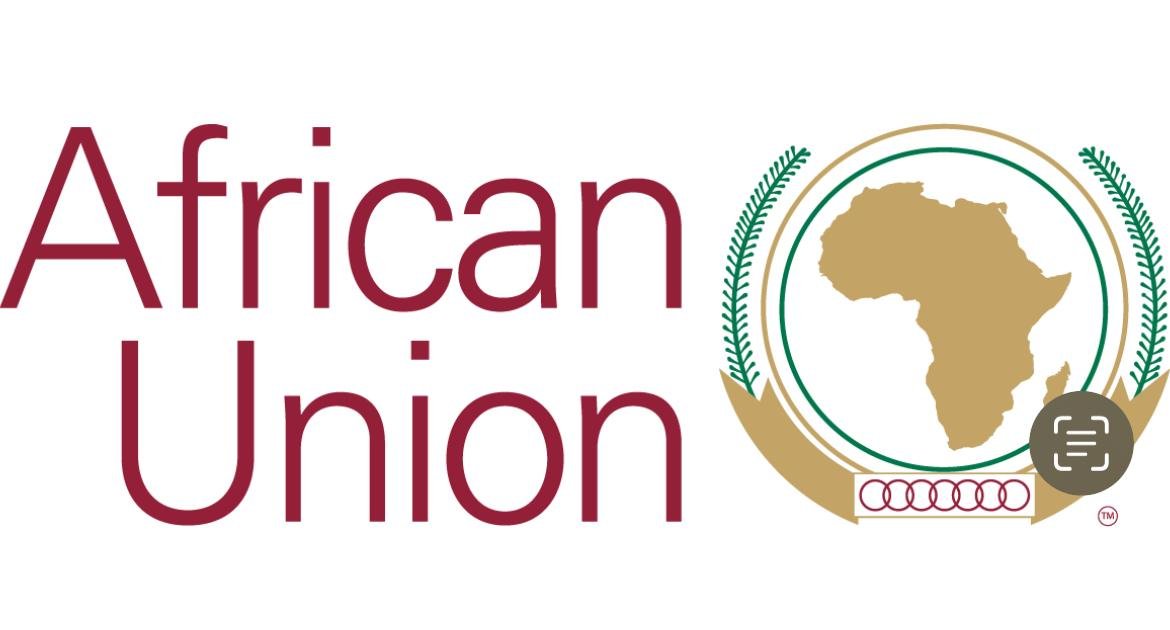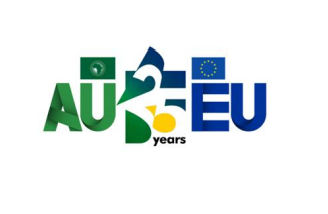

European Union – African Union
European Union – African Union 3rd Ministerial Meeting
21 May 2025 – Brussels, Belgium
Joint Declaration of Civil Society and Youth
This declaration was drafted following inputs from the EU-AU Civil Society and Youth Forum which took place on 20 May 2025. This Forum brought together a diverse representation of CSO-Youth organisations from Africa and Europe – from various sectors and geographies – to discuss and make recommendations on the EU-AU Ministerial Agenda, taking place on the next day in Brussels (Belgium) on Wednesday 21 May 2025.
Introduction
On 20 May 2025, a cohort of 85 youth and civil society organisation representatives from Africa and Europe participated in the EU-AU Ministerial Civil Society and Youth Forum. Organised jointly by the European Union and African Union, the virtual event provided a structured platform for engagement, enabling youth and CSOs to contribute their perspectives on key themes underpinning the Africa-Europe partnership, tabled as roundtable discussions in the Ministerial, including:
- - Peace, Security and Governance
- - Prosperity: Transport, Energy and Digital
- - People: Migration and Mobility,
- - Multilateralism.
1. Preamble
We recognise the important role of civil society and youth, adopting a human-rights based approach to policymaking. We re-affirm the universality and indivisibility of human rights on both continents.
We recognise the urgent need to protect civilians in conflict affected areas and call on all warring parties to respect the rights and protection of civilians.
Declaration Recommendations:
A. Peace, security and governance
1. Strengthen Institutional Commitment and Policy Coherence
We call on the EU and AU Institutions to:
Invest in the development and implementation of National Action Plans for peace and security. Foster the implementation of United Nations Security Council (UNSC) Resolution 2250 on Youth, Peace, and Security, and UN Security Council Resolution 1325 on 'Women, Peace and Security', adhering with this to the commitment to include youth and women in all levels of peace processes and decision-making.
In order to contextualise such plans, we call on the EU and AU institutions to link policies to resources and encourage civic engagement and establish joint AU-EU mechanisms.
2. Step up support for democratic institutions and political parties to foster inclusive governance.
The need for support and training of political parties was stressed. It was suggested to bring parties together and make sure they support pillars of democratic governments, as well as to accompany the linking of like-minded parties across both continents.
3. Ensure evidence-based decision making and Sustainable Approaches
We call on the EU and AU institutions to promote data-informed decision-making and engagement based on local evidence. CSO and Youth organisations call on enhancing evidence-based decision-making processes. Investment in research on peace and security, facilitating knowledge exchange between AU and EU institutions are crucial.
4. Integrate ecosystem restoration and climate resilience into peace processes and governance interventions.
Participants called for paying greater consideration to natural resources degradation, and addressing community-based restoration efforts, positioning ecosystems as critical for human security. This includes recognising that ecosystems are essential for mitigating livelihood shocks and climate-related risks.
5. Promote inclusive and localised peacebuilding
Participants called for promoting broad and genuine inclusion of cross-border and local communities including peace education and capacity strengthening. CSO-Youth participants urged to advance joint AUEU advocacy efforts to build local capacity for peaceful dispute resolution.
Youth representatives call for the expansion of access to education and economic empowerment by enhanced access to quality education, TVET, and digital literacy for youth and women.
Participants call on EU-AU institutions to create and expand flexible financing mechanisms that directly support youth, community-based CSOs, and human rights defenders working on peace and governance.
6. Protection and Crisis Response
CSO-Youth participants call on EU-AU institutions to enhance protection and emergency support for civilians in conflict and post-conflict areas. Strengthen African and European mechanisms for addressing conflict-related migration, refugees, and displaced persons. CSO-Youth representatives underline that the EU and AU must champion justice and accountability, as well as through international bodies.
B. Prosperity - energy, transport and digital
1. Accelerate Inclusive Green Energy Access
The EU-AU partnership should invest in decentralised renewable energy systems (e.g. solar mini-grids, biogas, wind) to improve access in underserved areas. Youth and women’s participation are crucial, and capacity-building to ensure long-term sustainability and local benefits.
2. Simplify Trade and Boost Regional Value Chains
To unlock Africa’s industrial potential, both unions must accelerate the implementation of the AfCFTA, simplify customs and cross-border procedures, and promote corridor infrastructure aligned with regional needs. Support to SMEs and cooperatives, non-tariff barriers reduction are key.
3. Bridge the Digital Divide to Unlock Innovation
Digitalisation and AI should be leveraged to drive economic growth and inclusion, but must start with ensuring universal, affordable internet access — especially in rural areas.
4. Align Investment with ESG and Local Ownership
The EU and AU should promote impact-driven investment by aligning all development finance with ESG principles, the SDGs, and local development goals.
C: People – migration and mobility
1. Expand Legal and Inclusive Migration Pathways
The EU should streamline and expand visa and work permit processes for legal migration between AU and EU states. We recommend supporting youth mobility through voluntary work, internships, and training programs, ensuring fair reciprocity. Migration governance must uphold human rights and dignity by ending the practice of externalizing border control to countries with poor rights records.
2. Invest in Migration Literacy, Resilience, and Legal Cooperation
We recommend investing in youth-focused migration literacy programs to counter misinformation and raise awareness about legal migration pathways, both online and offline. Community-based resilience programs must be funded to create local economic and educational opportunities that reduce irregular migration pressures.
3. Strengthen Digital Accountability and reinforce multilateral legal frameworks
We recommend the EU and AU enhance research on trafficking and online exploitation, while holding social media platforms accountable through stronger digital regulation. Finally, the EU and AU should equip law enforcement bodies with the tools to dismantle trafficking networks and improve intelligence-sharing across borders.
4. Reduce the Cost of Remittances and Promote Financial Inclusion, Create Mechanisms for Diaspora Investment
We recommend reducing the high cost of remittance transfers to Africa by supporting more competitive and transparent financial systems.
The EU should also create instruments such as diaspora bonds and EU–Africa funds to encourage diaspora-led contributions to public infrastructure and small businesses. Including diaspora voices in national development planning and migration policy will ensure that initiatives are relevant, inclusive, and accountable.
D: Multilateralism
1. Establishing a permanent AU-EU Youth and Civil Society Advisory Institutionalised Council
We recommend the establishment of a permanent AU-EU Youth and Civil Society Advisory Institutionalised Council with formal consultative status in AU-EU processes. This council would provide regular input on policies, especially those related to migration, climate, and governance.
2. Fostering an inclusive and future-proof global financial architecture
To enhance global financial architecture, we should focus on fostering cultural exchanges that promote collaboration in finance, AI, and digital technologies, with an emphasis on youth-led innovation and inclusive growth. By establishing cross-border partnerships, innovation hubs, and empowering young leaders, we can unlock untapped opportunities for a more inclusive, resilient, and culturally diverse global financial system.
3. Amplifying the voices of the marginalised
We should delocalise international forums to provide better and equitable access to consultation.
4. Ensuring a strong implementation of the UN Pact of the Future
We call on the EU and AU to support the CSO-Youth representatives in championing the implementation of the Pact of the Future across Africa and Europe and booster the chances of a successful achievement of the UN Sustainable Development Goals
Conclusion
We hereby engage to follow up on the content of the present Declaration and instruct Ms Sascha Gabizon, representing European Civil Society and Young people, and Ms Sabina Nforba, on behalf of the African Union Chairperson’s Office of the Youth Envoy and representing the African Civil Society Organizations and Young people, to bring the instances contained therein to the attention of and consideration by the Ministers of the European Union and of the African Union at the third Ministerial Meeting, taking place on 21 May 2025 in Brussels.
